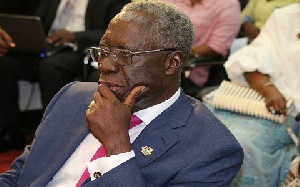Government will soon review the Petroleum Act to make it possible for it to use the Heritage Fund for key developmental projects, Senior Minister, Yaw OsafoMaafo has announced.
According to the Senior Minister, the move is better than having the Fund sit ideal while critical areas of the economy lack the needed support to make them more viable.
“We are going to look at the Heritage Fund. We want to introduce, per centas the President mentioned last week, fee-free education at the secondary level. And it is likely to be funded through the Petroleum Act,” Mr OsafoMaafo said.
“If that be the case, we have to make amendment and saypercentof the Heritage Fund or the Petroleum Fund would be used to support second cycle education;if we think that industry requires a stimulus that will enable it create more jobs that will in tend build the country for the future, we can look at it and put a certain amount for that too,” he added.
Mr OsafoMaafosaid government is also looking at developing,t hrough the Fund, the agricultural and other key sectors of the economy to support the future development of Ghana.
The Heritage Fund and the Ghana Stabilisation Fund are collectively known as the Ghana Petroleum Funds.
Government, after the discovery of oil in 2007, set up the Funds because it was feared that allowing all the oil revenue to flow into the hands of politicians in the name of infrastructure development could be too costly for the nation because of the perceived corruption in government.
Recently, however, some economic analysts and elements in government have been of the view that if the country has been able to develop strong transparency mechanisms to govern the Funds, then it should be able to do same with respect to the use of the funds for infrastructure development.
They are of the view that this would lay a strong foundation for present and future development while minimising the amount and cost of borrowing.
“What makes the use of the Ghana Petroleum Funds as a means of managing the oil revenue more worrisome in the face of the huge infrastructure deficit is that the country continues to borrow at very high rates of interest for infrastructure development, while part of the oil revenue continues to be kept in savings attracting insignificant rates of return,” a paper by the Institute of Fiscal Studies titled Revenue Earmarking in Ghana: Management and Performance Issues, states.
For instance, in 2015, government borrowed $1 billion for infrastructure development at an interest rate of 10.75 percent, while the country had a little over $500 million in the Petroleum Funds attracting a mere 0.74 percent rate of return.
The Senior Minister said it does not make economic sense to have that huge amount sitting in an account overseas and attracting little interests while Ghana borrows at high rates for infrastructural development.
“If the Heritage Fund is set aside for the future, the provision of infrastructure now and the development of industry to create more jobs is also for the youth who are the future,” Mr OsafoMaafo noted.
Business News of Friday, 17 February 2017
Source: The Finder













